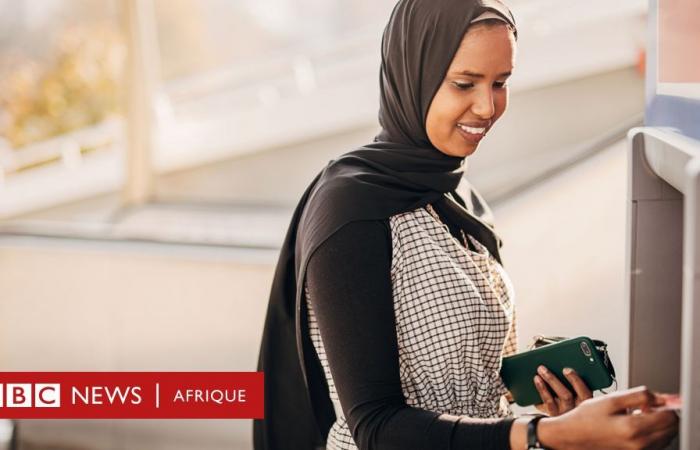Photo credit, Getty Images
- Author, Angel Bermudez
- Role, BBC News World
-
15 minutes ago
In a traditional bank, the interest rate is a key factor in completing any transaction. But in Islamic banking, this factor does not exist.
Savers and investors who go to a conventional bank want to know how much they will earn on their deposits, while debtors want to know how much extra money they will have to pay.
In Islamic banks, on the other hand, interest is neither charged nor paid. In fact, they are banned.
These institutions operate according to the principles of Sharia, the Islamic law that governs the lives of Muslims.
From this law other principles arise, such as, for example, that money must not cause harm.
“As a result, Islamic financial services do not invest in areas such as alcohol, tobacco or gambling,” explains the Bank of England, the central bank of the United Kingdom and one of the Western financial institutions that has opened up to Islamic finance in recent years.
But what is the reason for the ban on charging interest?
Money and the real economy
Celia de Anca, professor of Islamic finance at IE University (Spain), explains that the rejection of interest is not unique to Islamic culture, but that it also has common roots with the West.
“In Judeo-Christian and Islamic traditions, interest was forbidden, and in countries like Spain and France, there are still laws against usury. Usury is excessive interest. In all three traditions of the book, excessive interest has always been prohibited. The question is what is excessive. For Islam, any interest is already excessive. Therefore, all are prohibited”she explains to BBC Mundo.
Ms De Anca adds that in the Western tradition there was also a prohibition on interest which was shaped over the years until it was incorporated into anti-usury laws in force in many parts of the world.
Furthermore, Islamic finance seeks to ensure that profits come from activities linked to the real economy.
“Islamic finance is based on the belief that money has no value in itself. It is only a means of exchanging goods and services which have value,” says the Bank of England on its website.
“In other words, it should not be possible to make money with money. This means that, wherever possible, one should avoid paying or receiving interest,” adds -She.
Photo credit, Getty Images
De Anca explains that the rejection of interest is also present in important figures of Christian theology, such as Saint Thomas Aquinas.
According to Mexican professor and researcher Héctor Zagal Arreguín, “Saint Thomas admits that each object has its own purpose and its own exchange value in itself. However, he conceives of money as an object of exchange whose current value cannot increase without the mediation and work of an agent”.
Islamic culture also rejects the fact that money does not come from the real economy and instead encourages speculation and making profits without effort or work.
How do Islamic banks operate?
Interests, no; advantages, yes
Photo credit, Getty Images
Not charging interest forces Islamic banks to operate differently, but that does not mean they are operating at a loss or not making a profit.
“Interest is one thing and profit is another. Islamic banks are, of course, profit oriented. Furthermore, the Islamic world has a commercial tradition, it has always been very linked to commerce, with caravans in medieval times, for example,” says De Anca.
“And when it comes to profit, they don’t have an ethic of moderation, like perhaps the Catholic ethic. That doesn’t exist. We’re talking about profits and the more the better. “is, but these profits must be subject to rules.”
So, for example, banks can finance commercial transactions or productive projects in venture capital mode, that is, the institution will participate in the profits or losses of the transaction.
“The bank can invest capital in a project and, as the project produces, the profits can be shared or distributed at the end. This split does not have to be 50-50, it can be 80 -20 or other, depending on the contribution of each person,” explains De Anca.
According to the Bank of England, “Islamic finance also encourages partnership, so that wherever possible, profits and risks should be shared, either between two people, between a person and a business, or between one company and another.
Photo credit, Getty Images
The same principles apply to transactions with individuals.
So, for example, if a person opens a savings account in an Islamic bank, he will not receive interest on the money deposited there, but will be able to earn profits from the activities in which the bank has invested these funds .
In the case of people who need a loan from the bank to, for example, buy a house, there are several ways to proceed, according to De Anca:
1. The bank buys the property and then rents it to the person until it is paid off, in a type of financial lease.
2. The bank and the person buy the house in partnership. Then the person rents and gives the bank a portion of the rent profit until an agreed time when the person becomes the sole owner of the house.
3. The bank buys the property and resells it at a higher price to the individual, adding a commission to cover its expenses and profits.
This last modality is difficult to apply in many Western countries for tax reasons, because in places where there is a sales tax there is a risk of double taxation (when the bank buys the house and when the person buys the house). ‘buys from the bank), which makes the final cost too high.
However, Ms De Anca points out that in some countries, such as the United Kingdom, legal adjustments have been made so that these transactions only pay the tax once, taking into account that ultimately the bank only acts as an intermediary for granting the loan.
A booming sector
Although Islamic finance operates according to ancient Sharia principles, De Anca cautions that Islamic banking is actually a relatively new and modern phenomenon.
“Islamic banking began to develop in the 1950s and 1960s with a few initiatives in Pakistan and Egypt, but it was mainly from the 1970s, with the oil boom, that it developed,” explains -she.
“At that time, many people with significant capital asked conventional managers to manage their money in an Islamic and therefore interest-free way.
She sees it as a bottom-up movement, driven by people’s demand.
“There has been a strong demand from people who wanted to both invest and receive money in accordance with their Islamic values, and so there has been an industry able to provide a number of instruments to meet to this request,” she said.
According to the expert, the increase in the availability of Sharia-compliant financial services has also contributed to increasing banking penetration levels around the world.
“Most banks in Islamic countries are conventional, but that is why there have always been many people who did not want or have access to banks because they operated against the tenets of their religion,” she said.
Photo credit, Getty Images
He said this is one of the reasons why there used to be a large number of unbanked people in predominantly Islamic countries, but there are fewer and fewer because Islamic banking services are now available.
In 2022, the value of financial assets managed globally according to Islamic principles stood at some $4.5 trillion and is expected to reach $6.7 trillion by 2027, according to a report released this year by the Islamic Observatory. Islamic finance in Spain SCIEF – Casa Árabe.
More than 70% of these assets are managed by Islamic banks, which are already present in 77 countries.
Most Islamic financial assets are concentrated in the Gulf Cooperation Council member countries (53.60%), followed by Southeast Asia (23.30%), the Middle East and the South Asia (18.60%). Africa and Europe also appear, but with a share of total assets of 2.7% and 1.7% respectively.






